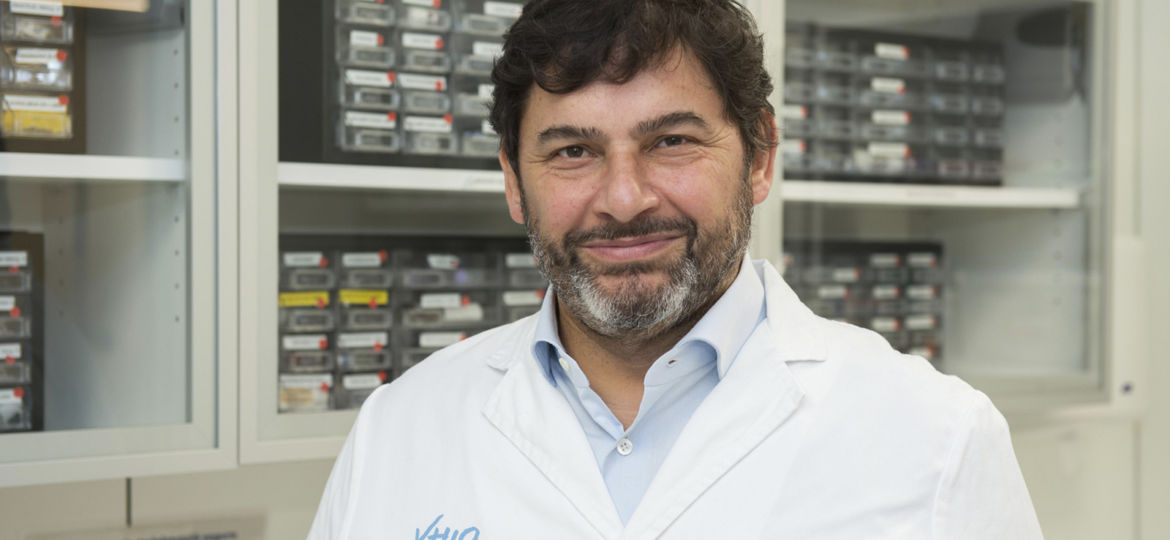
- Research led by VHIO investigators represents a step forward in better understanding the underlying mechanisms that drive disease progression in chronic lymphocytic leukemia (CLL).
- Results published open-access in Biomarker Research indicate that genetic evolution is not the main driver of CLL progression. Pointing to the involvement of the leukemic immune microenvironment as a co-culprit, these findings shed light on why some patients progress and others do not.
- Increased immune cell exhaustion was observed in patients with progression. The study of malignant cells in this population showed a greater capacity to escape the immune system.
- These findings could support the design of clinical studies assessing immunotherapy in early stages of disease to prevent or delay clinical progression, as well as identify novel biomarkers to improve early detection of patients whose disease will likely progress.
Barcelona, 12 July 2021. Chronic lymphocytic leukemia (CLL) is the most common blood cancer in adults. According to a recent, global study (1) the incidence rates of CLL significantly increased between 1990-2017 in most countries, suggesting that this type of leukemia might become a major global public health concern.
CLL has a highly variable disease course across patients. Almost half present with progressive disease requiring various lines of therapy. The other half have a more indolent disease, needing little or no treatment, and have a longer survival. While the therapeutic landscape for progressive disease has improved over recent years with the approval of more potent targeted agents, the majority of these patients inevitably experience disease recurrence or persistence.
While important insights have provided a deeper understanding of the underlying biology of this disease, the mechanisms driving the progression of CLL from its early stages are not yet fully understood. Research directed by Francesc Bosch, Principal Investigator of VHIO’s Experimental Hematology Group, sought to identify new biological features of clinical progression by studying the specific changes that occur in patients that progress compared to those occurring in patients who remain asymptomatic along time. Results from this study, recently published as an open access article in Biomarker Research (2), suggest that changes in the immune system could explain why some patients progress and others do not.
Findings reported by Francesc Bosch’s group from initial longitudinal genetic studies, carried out at the time of diagnosis and at disease progression before treatment, showed non-recurrent and limited changes in around half of these patients. This observation led his team to hypothesize that CLL progression is not principally driven by dynamic genetic clonal evolution. “This study is the first comprehensive longitudinal analysis of the genetic and immunological processes driving disease progression in CLL. It has enabled us to establish that genetic changes are not the main drivers of disease progression. Our findings indicate that alterations in the immune microenvironment are highly significant”, commented Marta Crespo, Translational Research Coordinator of VHIO’s Experimental Hematology Group, Vall d’Hebron Barcelona Hospital Campus, and co-corresponding author of the study.
The VHIO investigators analyzed samples at diagnosis and at long-term follow-up of patients with clinical progression, within three to four years between the two, and from patients with stable disease. “We studied the changes that occurred from diagnosis to clinical progression, that were not associated with the subsequent passing of time but differed among patients with progressive CLL compared with those with stable disease”, added Marta Crespo.
In concordance with previous studies, this longitudinal analysis showed that genetic alterations do not explain disease progression since they occurred randomly, and in both groups of patients. “By investigating the immune system we are starting to reveal differences that could be key to explaining why this disease progresses in some patients and not in others. Changes in immune cells reduce their capacity to recognize and kill malignant cells, and alterations in cancer cells empower them to escape the immune surveillance of tumors”, said Francesc Bosch, co-corresponding author and Head of the Hematology Service at the Vall d’Hebron University Hospital (HUVH).
Altogether, these results could provide a rationale for the use of early immunotherapeutic interventions in early stages of CLL aimed at avoiding or delaying disease progression. In this respect, their analysis of the immunological changes showed that patients suffering from progressive disease had a greater accumulation of CD8+ T cells showing increased, terminal exhaustion. This increased exhaustion can be induced by interleukin- 10 secreted by leukemic cells. In patients with progression the VHIO investigators also observed an increase in the expression of some inhibitory receptors of the immune system such as PD1, CD244 or CD160. All these changes lead to a more rapid deterioration of the immune system; reducing its capacity to hone in on and attack malignant cells.
“Additional analysis of both immunological and malignant cell-intrinsic factors in larger cohorts of patients will help us to better identify those patients who are more likely to progress shortly after diagnosis, and more precisely guide clinical decision-making”, concluded Marta Crespo.
References
- Dong Y, Shi O, Zeng Q, Lu X, Wang W, Li Y, Wang Q. Leukemia incidence trends at the global, regional, and national level between 1990 and 2017. Exp Hematol Oncol. 2020 Jun 19;9:14.
- Jiménez I, Tazón-Vega B, Abrisqueta P, Nieto JC, Bobillo S, Palacio-García C, Carabia J, Valdés-Mas R, Munuera M, Puigdefàbregas L, Parra G, Esteve-Codina A, Franco-Jarava C, Iacoboni G, Terol MJ, García-Marco JA, Crespo M, Bosch F. Immunological and genetic kinetics from diagnosis to clinical progression in chronic lymphocytic leukemia. Biomark Res. 2021 May 20;9(1):37.















